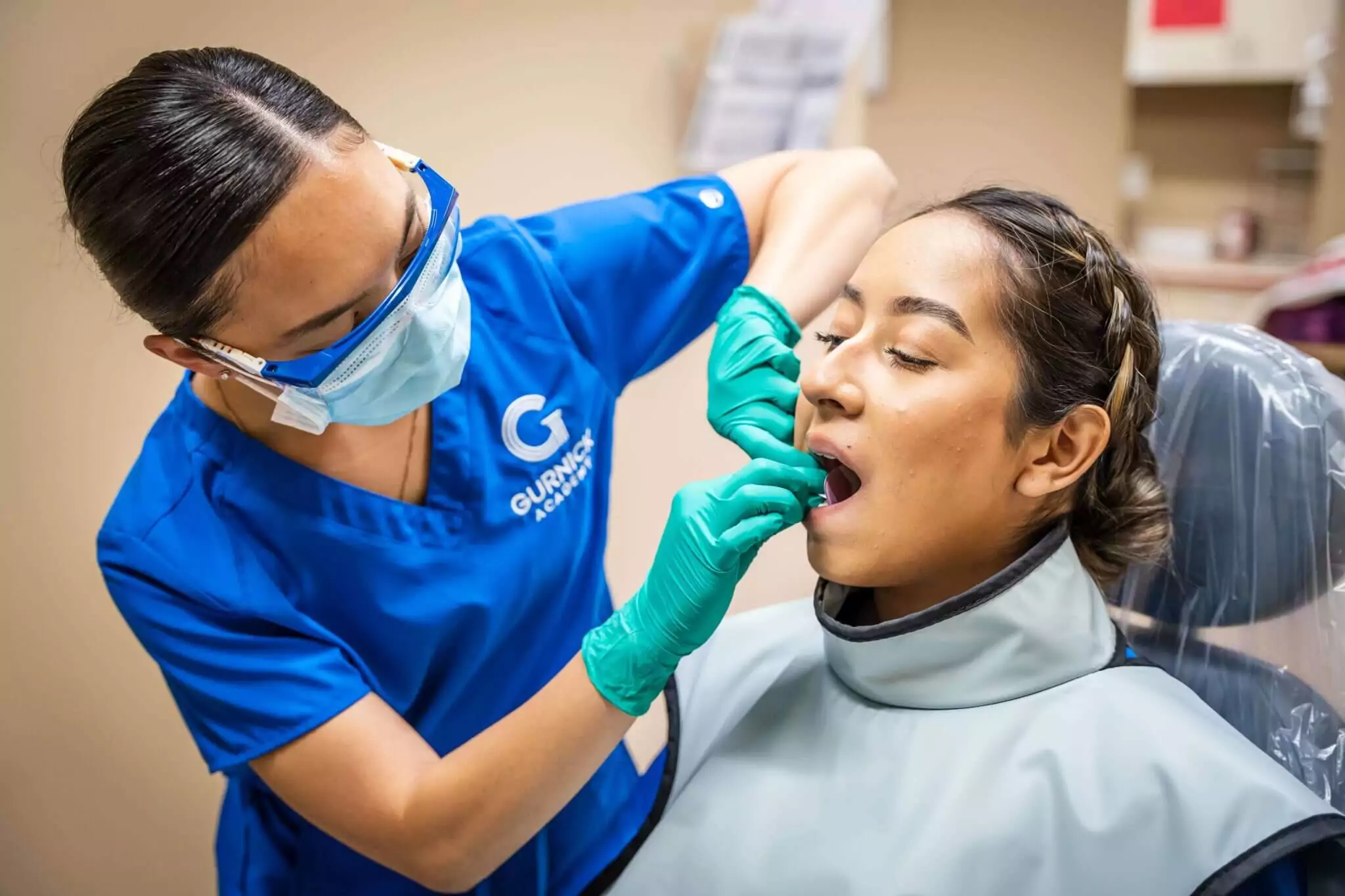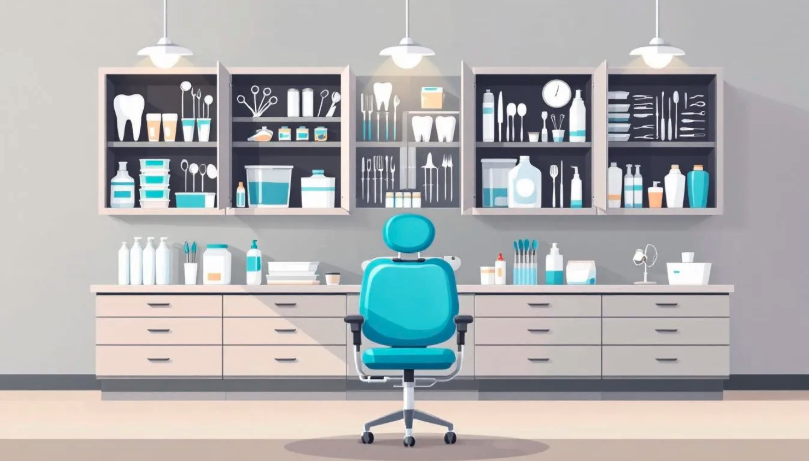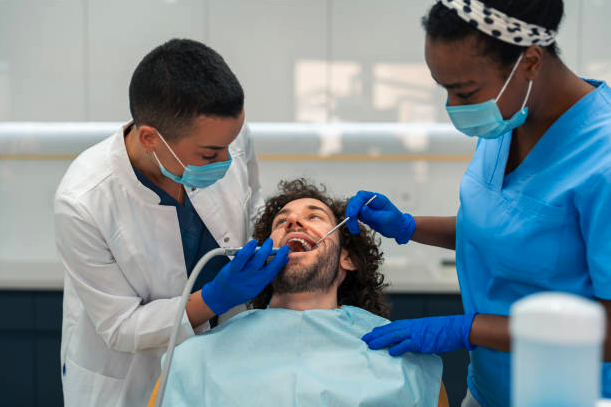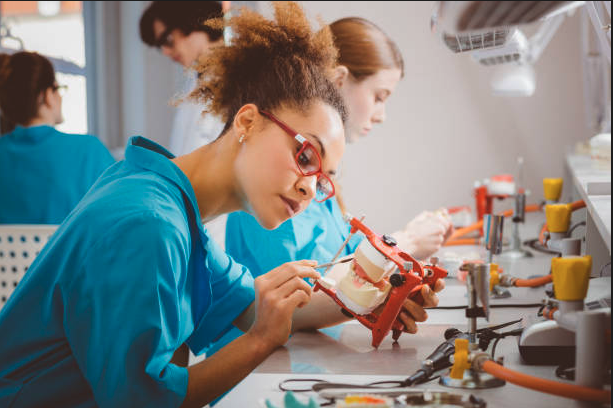Table of contents
Get Started with Kwikly
Get the latest updates, insights, and exclusive content delivered straight to your inbox.
Who This is For:
- Current dental assistants seeking practical advice
- New dental assistant graduates entering the field
- Dental hygiene students wanting a well-rounded perspective
- Dental office managers training new staff
- Anyone pursuing a career in dental assisting or support roles
Key Takeaways
- Good communication, staying organized, and knowing your dental instruments inside and out - these are the skills you need to give patients better care and make everything run smoother at work.
- When you really listen and explain what’s happening during procedures, you can help patients feel way less anxious. That builds trust and makes people happier with their experience.
- Using tech like digital patient records and scheduling software makes everything easier and helps you give better care. It’s just a smarter way to work.
- Leveraging these tips and technology can help dental assistants manage tasks more efficiently and reduce stress in the workplace.
Want to be great at your job as a dental assistant? These tips can help you become a better dental assistant by improving your skills and enhancing your patient care. This guide’s got the essential tips you need to take better care of patients, talk with them better, and nail the skills that really matter. You’ll find practical stuff that’ll make your workday smoother and way more efficient.
Essential Skills for Dental Assistants

If you’re thinking about excelling in dental assisting, you’ve got to master some core skills. Getting these down means you’ll deliver top-notch patient care and keep things running smooth with your dental team. Dental hygienists are also key members of the dental team, working alongside dental assistants and dentists to provide comprehensive care.
You need to communicate well. It’s that simple. When you talk clearly with patients and your teammates, you’re building trust and helping people feel less anxious. That’s huge in a dental office.
Being organized? That’s another must-have. You’re juggling schedules, keeping track of patient records, and a million other things. You are also responsible for maintaining accurate records and a clean workspace. When your workspace is organized, everything flows better and you’re not making mistakes during procedures.
Dental assistants have a responsibility to provide excellent patient care and support the dental team. And here’s the thing - you’ve got to know your dental instruments inside and out. When you understand what each tool does and how to use it properly, you can really support your dentist and keep patients safe.
Communicate Effectively
Good communication is what makes or breaks a dental practice. As a dental assistant, how well you communicate with patients and your colleagues can totally change someone’s experience. Here’s what that looks like:
- Speaking clearly
- Actually listening to understand what patients are worried about
- Using simple language that people can relate to, especially with kids, so they’re not scared out of their minds. These communication strategies are especially helpful for making children feel comfortable and at ease during their visit.
Active listening is where it’s at. When you really hear what patients are saying about their concerns and fears, you can respond in a way that actually helps. That empathy you show? It builds trust and makes people want to work with you instead of against you.
This communication thing works with your colleagues too. When you’re clear and to the point, your whole team stays on the same page. No confusion, no wasted time, just better efficiency. Work on these skills and you’ll create a workplace that actually feels good to be in.
Stay Organized
In busy dental offices, staying organized isn’t just nice to have - it’s what keeps you sane and efficient. Use checklists to manage your daily tasks and track patient care. Trust me, it’ll improve your workflow and you won’t miss anything important.
Your workspace matters just as much. A clean, organized area doesn’t just look professional - it actually prevents mistakes during procedures. When you coordinate well with the front office staff, appointments run on time and patients get the care they need without delays.
Digital patient records are game-changers for dental practices. Efficiently managing patient records is a key part of staying organized and maintaining a smooth workflow. Here’s why they’re so valuable:
- They make patient information more accurate and easier to access
- You can pull up and update records quickly and efficiently
- Less paperwork means your office runs smoother and stays more organized
Master Dental Instruments
You need to really understand dental instruments if you want to succeed as a dental assistant. When you know the names and what each tool does, you can provide solid support during procedures and keep patients safe. This knowledge becomes even more important during complex treatments where you need to handle instruments precisely.
Practice with dental instruments regularly. It’s crucial. When you’re familiar with each tool, you can assist efficiently during procedures, which means better patient care and smoother operations. Keep those instruments maintained properly and they’ll last longer and work reliably.
When you master dental instruments, you become someone your dental team can’t do without. Your ability to anticipate what the dentist needs and hand over the right tools at the right moment? That can seriously improve how efficiently and effectively procedures go.
Explaining what each instrument does in simple, relatable terms—like comparing the suction to a vacuum cleaner—can help make children feel more at ease during their visit.
Enhancing Patient Care in Dental Offices

Patient care is what it’s all about when you’re working as a dental assistant. Your role in making patients feel better isn’t just about knowing the technical stuff - it’s about connecting with people. When you communicate well, both with your words and your body language, you help patients feel heard and valued. That empathy you show? It creates trust, and that’s what makes the whole experience better for everyone.
Focusing on the well-being of both patients and staff leads to better patient care. Every team member, including dental assistants, plays a vital role in creating a positive patient experience.
Digital patient records make your life easier too. You can get to accurate patient info right away, and the whole team stays on the same page. When you keep up with new dental tech, you’re helping patients get better diagnoses and treatment. It’s worth staying current.
Practice Active Listening
You've got to really listen if you want to give great patient care. When you understand what's worrying patients during intake, everything runs smoother. You're picking up on what they're not saying too, and asking the right follow-up questions when something isn't clear.
When you listen like this, patients trust you more and feel less anxious. That means better care all around. Check in with your patients regularly, and keep them distracted with good conversation - especially the kids. It makes a huge difference.
This kind of empathetic approach just creates a better environment for everyone.
Explain Procedures Clearly
You want patients to feel comfortable and work with you, right? Then you've got to explain what's happening. When patients know what to expect, they're way less anxious. This is especially true for kids. Use language they can understand and show them things like tooth models - it makes everything less scary.
When you're explaining procedures, here's what works:
- Take your time and be thorough.
- Talk directly to the child.
- Use comparisons they'll get to help them understand what the instruments do.
- Bring in stories or music as distractions during procedures - it makes kids way more comfortable.
Ensure Clean and Comfortable Exam Rooms
When patients see a clean, organized exam room, they know you take hygiene seriously. It makes them feel confident about your office. A tidy space also makes your job easier and safer.
Keep those exam rooms consistently clean and comfortable, and you'll see patient satisfaction and trust go way up.
Managing Responsibilities Efficiently
You’ve got a lot on your plate as a dental assistant, and managing it all efficiently keeps the practice running smooth. Completing tasks efficiently is essential to ensure the workflow stays on track. You’re handling patient records, prepping instruments, performing a range of duties throughout the day, and helping during various procedures—the works. Your technical skills with equipment and keeping accurate records? That’s what makes treatments safe and effective.
Here’s the thing - automating routine tasks changes everything. When you use digital tools for scheduling and patient records, you can spend more time on patient care instead of paperwork.
Stay flexible and ready for whatever comes up. Emergencies happen, schedules change last minute - being prepared for the unexpected keeps everything running smooth.
Scheduling Appointments
Good scheduling means patients aren’t waiting around, and that makes everyone happier. When you know your scheduling software inside and out, appointments stay on track and you can efficiently accommodate many patients without causing delays. Keep a waitlist going - it’s great for filling those last-minute cancellations and keeps things running efficiently.
Effective scheduling is about understanding what patients need and staying flexible. Update that schedule in real time and work with your front office team. Communicating with patients before their appointment helps them prepare for their visit, reduces anxiety, and ensures a smooth experience. That’s how you manage appointments well and keep patient care timely.
Taking Impressions and X-rays
Getting accurate impressions and X-rays is a big deal - these are critical for successful treatments and happy patients. Always follow the correct procedure for taking impressions and X-rays to ensure accuracy and patient safety. For X-rays, you want proper positioning, calibrated equipment, and safety protocols every time. That’s how you get quality results.
When you’re good at impressions and X-rays, patient outcomes get better and the practice runs more efficiently. If you need more training in any area, go for it. It helps you give the best care possible.
Infection Control Practices
You can't mess around with infection control - patient safety and practice success depend on it. Stay up to date with the latest protocols and stick to them consistently. Regular training and updates aren't optional - they're essential for keeping everyone safe.
Maintaining and sterilizing instruments is huge for infection control. When you properly sanitize equipment before impressions and X-rays, you're preventing infections and protecting patient health.
Professional Development and Continuing Education

If you’re working as a dental assistant, chances are you know that keeping up with new developments in dental care isn’t just nice to have—it’s essential for advancing your careers. Most dental assistants go through six to eleven months of training in a dental assistant training program, where you’ll cover everything from biology and anatomy to physiology and dental radiology. Choosing a comprehensive dental assistant training program or dental assistant school is important to ensure you acquire the essential skills needed for the profession. Having completed a recognized training program or certification demonstrates your commitment and readiness for the demands of the field.
Learning from experienced professionals is invaluable, as they can help you develop practical skills and improve patient care. On-the-job opportunities to train new dental assistants are also important, allowing you to gain hands-on experience and learn the ropes under guidance. It’s crucial that dental assistants are properly trained before taking on full responsibilities in the workplace. Additional certifications and ongoing training can enhance your qualifications and career prospects, helping you stay competitive and up-to-date in the field.
Building connections with other professionals and finding mentors is huge for moving your career forward. Here’s how you can really boost your career:
- Join industry organizations
- Show up to networking events where you can meet seasoned professionals
- Build your own support network in the dental world so you’ve got people who can give you solid advice and cheer you on.
Pursue Continuing Education
Here’s why continuing education matters so much for you as a dental assistant:
- You’ll stay in the loop about the latest procedures and tech
- You’ll keep up with what’s new and get better at what you do
- You can think about going for advanced certifications and specialized training to really move up
- You’ll stay current with advancements in dental procedures, ensuring you’re always prepared for evolving techniques and technologies
There are tons of ways to learn—online courses, workshops, conferences—all designed to give you the knowledge and skills you need to shine. Take impression techniques, for example. Getting proper training in this area is crucial for making accurate dental impressions, and it’s a perfect example of why staying on top of your education really pays off.
Seek Feedback and Mentorship
Getting feedback and finding a mentor can be a game-changer for your growth. When experienced colleagues give you constructive feedback, it helps you figure out where you can improve and polish those skills you’ve been working on.
Seeking feedback and mentorship from other dental assistants not only helps you improve your skills but also enhances teamwork and communication within the dental team.
Finding mentorship relationships right where you work gives you guidance, support, and insights that can really shape your career path.
Set Career Goals
Having clear career goals is everything when you’re trying to grow in the dental assisting field. Focusing on your long-term career goals and personal development is essential for achieving success in dental assisting. Going after advanced certifications and continuing your education helps you move up and stay current with the latest practices and technologies. Keep a positive attitude and be proactive about learning and developing yourself—it’s key for making connections and working better with your team.
Your career goals should be specific, measurable, achievable, relevant, and time-bound (SMART). This way, you’ll have a clear direction and can actually see how you’re progressing. Make it a habit to review and tweak these goals regularly—it’ll help you stay motivated and reach that long-term success you’re after.
Balancing Work and Life

Getting a good work-life balance isn't just nice to have - it's what keeps you from burning out and feeling miserable. If you're working as a dental assistant, chances are your schedule is packed and your responsibilities feel endless. Here's the thing though: you can actually manage your time better and cut down on stress. It's about setting boundaries you actually stick to, learning when to say no, and using planners that work for you.
Taking care of yourself isn't optional if you want to stay healthy, both mentally and physically. When you get regular exercise, practice mindfulness, and actually get enough sleep, you'll notice your job satisfaction goes up and you get more done.
Time Management Tips
You've got patient care, paperwork, and continuing education to juggle - and that's just the start. The trick is creating a daily schedule that actually works and figuring out what needs to happen first. When you stay organized, you can handle everything that comes your way. Digital planners and apps aren't just trendy - they really can help you get your tasks sorted and boost your productivity.
When you manage your time well, you're less stressed and the office runs smoother. That means you can focus on giving patients great care while still having a life outside of work.
Self-Care Practices
You can't pour from an empty cup, and self-care is what keeps you filled up and prevents burnout. Something as simple as walking or stretching can boost your energy and make you more productive. Don't skip your breaks during work - you need that time to recharge and stay focused so you can give patients your best.
Eating well and getting enough sleep aren't luxuries - they're what keep your brain sharp and your emotions stable. If you've never tried meditation or mindfulness, it's worth a shot for managing stress. And don't forget about hobbies - they boost your creativity and give you something to look forward to outside of work.
When you actually make these self-care practices part of your routine, you'll handle your job better and enjoy it more.
Building a Support System
Having solid relationships with your coworkers can make a huge difference in how stressed you feel. When you participate in team activities and keep communication open, you're building bonds that create a supportive environment. Everyone in the dental practice matters, and when you all work together, it shows.
A good support system doesn't just make you happier at work - it leads to better patient care and a workplace where people actually want to collaborate.
Utilizing Technology in Dental Practices

Staying current with new dental tech isn’t just nice to have—it’s essential if you want to keep up with what patients expect and grow your skills. When you use technology in your dental practice, you’re not just making things run smoother. You’re also giving patients better care, and they’ll notice the difference. New technologies are transforming dental work by making procedures more efficient and effective for both dental assistants and patients. The best way to stay on top of new tech and trends? Jump into training and educational opportunities whenever you can.
If you join professional organizations, you’ll get access to updated educational modules that focus on the latest practices and technologies. It’s a simple way to make sure you’re always in the know about what’s happening in dentistry. When you embrace technology, you’re helping create a more efficient and effective dental practice.
Getting Comfortable with Scheduling Software
You need to know how to use scheduling software if you want to streamline operations and cut down on delays. Good scheduling means patients don't wait around as much, they're happier, and you're making the best use of your dental resources.
When you master scheduling software, you're helping make the whole dental office run better. That's good for everyone—staff and patients alike.
Working with Digital Patient Records
Digital patient records help you avoid the mistakes that come with handwritten notes. Everything's clearer and more accurate. Here's what you get:
- Storage that actually works—no more lost or misplaced documents
- You can access data when you need it
- Quick retrieval of patient information whenever you need it
These perks add up to better patient care overall.
To handle digital patient records the right way, you should keep the system updated regularly and make sure patient information stays confidential and secure. When digital records work efficiently, patient care gets better because communication flows smoother and workflows just work better throughout the dental practice.
Getting on Board with New Dental Technologies
You need to keep learning about new tools and technologies if you want to stay good at what you do. Staying updated with emerging technologies helps you maintain an edge in your career and get better at diagnosing problems. When you master advanced tools like digital radiography and intraoral scanners, you’re significantly improving the quality of patient care and treatment outcomes.
Dental assistants work closely with dentists to implement and utilize new dental technologies, ensuring that both the dental team and patients benefit from the latest advancements.
By getting on board with new dental technologies, you’re contributing to a more efficient and effective dental practice. This forward-thinking approach doesn’t just benefit patients—it makes the whole dental office operation better, creating a more dynamic and innovative environment that’s better for everyone.
Summary
When it comes down to it, being an effective dental assistant means you need a mix of essential skills, smart management of your responsibilities, ongoing professional development, and a good balance between work and life. When you master communication, stay organized, and keep up with tech advances, you can significantly improve patient care and how efficiently things run. Take these tips and strategies to heart, and you'll excel in your dental assisting career while making a real difference for both your patients and your dental team.
Frequently Asked Questions
Why is effective communication important for dental assistants?
Effective communication is crucial for you as a dental assistant because it helps calm down anxious patients, builds trust, and keeps interactions clear. All of this leads to better patient care and smoother operations.
How can dental assistants stay organized in a busy dental office?
To stay organized in a busy dental office, you should use checklists, keep your workspace tidy, work well with front office staff, and use digital patient records. This approach will help you manage your dental office better and boost overall efficiency.
What are the benefits of continuing education for dental assistants?
Continuing education is essential for you because it keeps you updated on modern procedures and technologies, builds your skills, and opens doors to advanced certifications that can advance your career. When you commit to lifelong learning, you grow professionally and improve patient care.
How can dental assistants manage their responsibilities efficiently?
You can efficiently manage your responsibilities by using digital tools for scheduling and patient records, while also building up your technical skills and keeping accurate documentation. This approach helps you stay adaptable and improves your overall workflow.
Why is self-care important for dental assistants?
Self-care is crucial for you because it keeps you healthy overall and prevents burnout, which ultimately makes you better at providing quality patient care. When you incorporate things like regular exercise, mindfulness, and enough rest, you'll see real improvements in how you perform at work and how satisfied you feel with your job.








